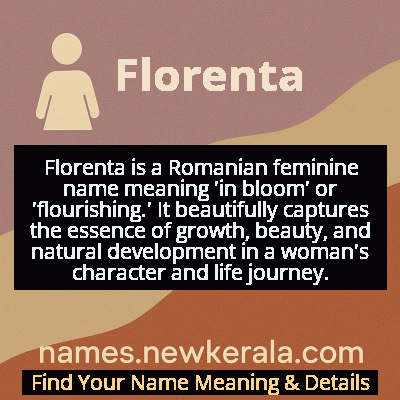Florenta Name Meaning & Details
Origin, Popularity, Numerology Analysis & Name Meaning of Florenta
Discover the origin, meaning, and cultural significance of the name FLORENTA. Delve into its historical roots and explore the lasting impact it has had on communities and traditions.
Name
Florenta
Gender
Female
Origin
Romanian
Lucky Number
1
Meaning of the Name - Florenta
Florenta is a Romanian feminine name meaning 'in bloom' or 'flourishing.' It beautifully captures the essence of growth, beauty, and natural development in a woman's character and life journey.
Florenta - Complete Numerology Analysis
Your Numerology Number
Based on Pythagorean Numerology System
Ruling Planet
Sun
Positive Nature
Leaders, ambitious, highly driven, self-reliant, innovative.
Negative Traits
Overly aggressive, domineering, impatient, selfish.
Lucky Colours
Red, orange, gold.
Lucky Days
Sunday.
Lucky Stones
Ruby, garnet.
Harmony Numbers
2, 3, 9.
Best Suited Professions
Entrepreneurs, managers, engineers.
What People Like About You
Courage, determination, leadership.
Famous People Named Florenta
Florenta Mihai
Tennis Player
Reached French Open quarterfinals in 1977
Florenta Spătaru
Singer
Preserved traditional Romanian musical styles
Florenta Crăciunescu
Athletics Coach
Trained multiple national champions
Name Variations & International Equivalents
Click on blue names to explore their detailed meanings. Gray names with will be available soon.
Cultural & Historical Significance
Extended Personality Analysis
Women named Florenta are typically characterized by a unique blend of traditional values and modern resilience. They often possess a natural elegance and grace that comes from deep self-awareness and emotional intelligence. Florentas tend to be highly intuitive, able to read situations and people with remarkable accuracy, which makes them excellent mediators and trusted confidantes. Their nurturing nature manifests in their relationships, where they naturally encourage others to grow and flourish—living up to their name's meaning of 'blooming.' Despite their gentle exterior, Florentas possess considerable inner strength and determination, able to withstand challenges while maintaining their core values. They typically value beauty and harmony in their surroundings, often expressing themselves through artistic pursuits or creating welcoming environments. Their personality combines practical wisdom with creative vision, making them both grounded and inspirational. Florentas are often the emotional centers of their families and social circles, providing stability while encouraging growth in those around them.
Modern Usage & Popularity
In contemporary Romania, Florenta maintains a respected position as a classic feminine name that balances tradition with modern appeal. While not experiencing the explosive popularity of some modern invented names, it enjoys consistent usage particularly among educated urban families and those with strong connections to Romanian cultural heritage. The name has seen a gentle revival in the 21st century as part of a broader trend toward rediscovering traditional Romanian names with meaningful origins. Statistics from the National Authority for Civil Status show Florenta ranking outside the top 50 but maintaining steady numbers year over year, indicating its status as a timeless choice rather than a passing trend. The name is particularly favored in regions with strong historical consciousness, such as Transylvania and Moldova. Modern parents often choose Florenta for its elegant sound, positive meaning, and connection to Romanian identity within the European context. The name adapts well to contemporary life, with common nicknames like 'Flo' or 'Flora' making it accessible in informal settings.
Symbolic & Spiritual Meanings
Florenta carries rich symbolic meanings centered around growth, transformation, and natural beauty. The name symbolizes the entire lifecycle of flowering—from the hidden potential of the seed through the struggle of growth to the glorious moment of blooming. This makes it a powerful metaphor for personal development, creative expression, and spiritual awakening. Symbolically, Florenta represents the conditions needed for flourishing: proper nourishment, patience, and the courage to unfold one's true nature. The name connects to archetypal symbols of the garden and paradise, suggesting harmony between human cultivation and natural abundance. In psychological terms, it symbolizes the integration of different aspects of self into a harmonious whole. The symbolic meaning extends to relationships, representing the mutual nurturing that allows love and connection to blossom. Florenta also carries seasonal symbolism, embodying the promise of spring after winter—hope, renewal, and the eternal cycle of life overcoming dormancy.

